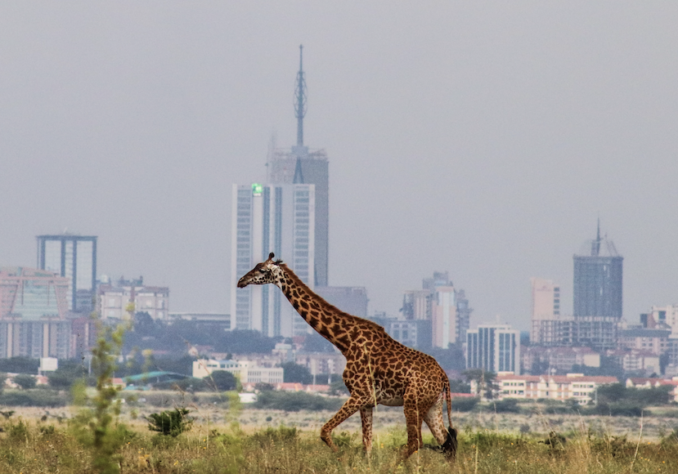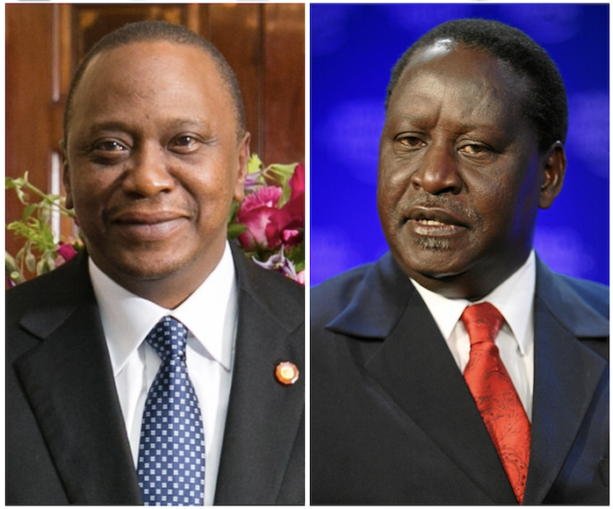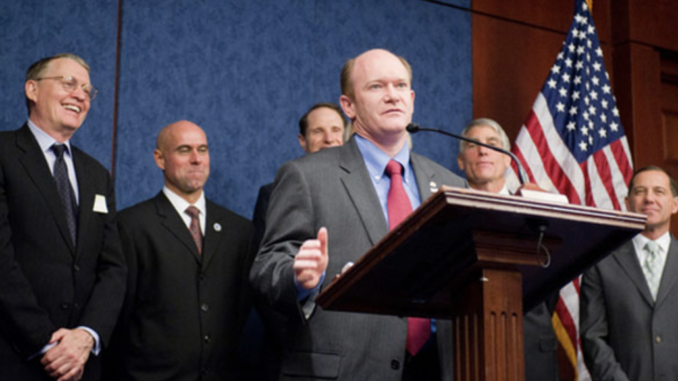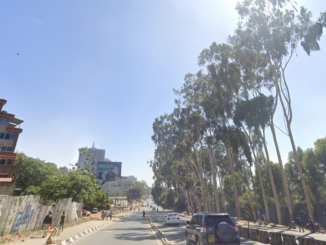21 August 2022

A Maasai giraffe with the Britam Tower,
Alexmbogo – Licence CC BY-SA 4.0
Westerners, the outgoing president (Uhuru Kenyatta), and former opposition leader (Raila Odinga) wish to force a barmy government in which the pursuit of citizen wellbeing is halted in favour of pursuing undefined ‘national unity’ like the 2007-2018 and 2017-2022 governments. I use the term Barmy to define a form of government that encompasses all parties and hence lack opposition and, in turn, checks and balances. However, I foresee them failing to achieve this goal but their attempts constitute a serious threat to democracy. A large government encompassing all popular politicians from every tribe shows the classic English tenet of divide and rule as politicians purport to always disagree on policies aimed at benefiting citizens but agree on everything benefiting them. Westerners like such a format in that it preferentially favours their corporations.
Background
Kenya is a medium-sized country (by African standards) located on the east coast of Africa. It is by far the richest economy in east Africa with a nominal GDP of slightly over $100 billion. Its economy constitutes close to half of the region with seven countries. Globally, its economy is 63 largest and is ahead of Bulgaria, Belarus, and Uzbekistan. This country has had a very unique growth model as it has very few minerals of any significance as compared to Tanzania to the south which is endowed with gas reserves and precious stones including the spectacular Tanzanite. Also, Uganda to the east, though landlocked, has larger access to Africa’s largest lake and is the source of the River Nile, Africa’s longest river. Tanzania also has larger access to Africa’s largest and deepest lakes. So, what is the source of Kenya’s fortune? Its 47 million diverse, skilled, hardworking, and motivated people.
The country punches above its weight in different areas. In athletics, it is a dominant force globally and a clear leader in Africa. Equally, the global coffee and tea market features high-quality Kenyan products. This is also the case for various skills markets including IT specialists and journalists. The country also boasts a vibrant democracy holding regular elections, but this is where things get interesting.
Kenya’s export profile (links to the Harvard Atlas of Economic Complexity)
You would expect Kenya to have thriving and accessible healthcare or robust social welfare but that is not the case. Kenyans have gotten ahead by working hard and supporting each other. So, what does the government do? Rather, what kind of government does Kenya have?
Ruling and Opposition Parties in the Same Government
It was not in the interest of Westerners and the current president to have a free, fair, and verifiable election. In my view, such a government is unacceptable to them. There has been a tendency by Western players and Kenya’s deep state to subvert democratic will. This article illustrates such efforts in which the so-called ‘unity government’ is formed by engineering an elections impasse. In 2017, despite one party having a clear majority, the election had unjustifiable procedural errors including filling of results in wrong forms and failure of party agents to sign. The Supreme Court of Kenya quashed the election by ruling that it was unverifiable. However, the opposition strangely avoided the repeat elections, indicating that both sides had agreed to deny Kenyans a clear winner. Therefore, President Uhuru Kenyatta and opposition leader Raila Odinga formed a barmy government without any opposition that has been mired in corruption scandals and failure to observe numerous court orders.
The president failed to implement election promises including his party manifesto, and instead pledged with the opposition leader to ‘unify’ the country, a highly qualitative and immeasurable goal. It has been under his administration that price inflation including wheat, maize flour, and cooking LPG gas prices rose by over 100%. The president has ended up supporting the former opposition leader to succeed him but seems interested in forcing another barmy government as I will illustrate below.

Uhuru Kenyatta (left) and Raila Odinga (right),
Amanda Lucidon/World Economic Forum – Licence CC BY-SA 2.0
Preference for Elections without a Winner
Have you experienced a situation where a country holds elections, no party has a verifiable lead, and all parties form one government without a manifesto for the rest of the term? If you haven’t, welcome to Kenya. We have had such elections in 2007 and 2017, which is considered the greatest threat to Kenya democracy. Kenya’s regular elections do not guarantee the presence of distinct governing and opposition parties, but a Barmy government encompassing both is common. Conditions are being created to achieve such a government after the latest election of 9th August 2022.
Immediately after the declaration of election results on 16th August 2022, an article appeared in Erie Now titled William Ruto Defeats Government-Backed Opposition Leader to win Kenyan presidency. It was also uploaded to CNN but its heading has hence been changed. Readers may wonder how the government can back the opposition but the Kenyan situation is even more interesting in that since the last election, the government joined hands with the opposition after they engineered an election impasse that got two parties coming together to allegedly ‘unite the country’.
The situation was also similar to how the government joined the opposition in 2008 forming a hermaphrodite government that could not be held to account. In both instances, both parties suspended their manifestos and governed in a laissez-faire style focusing on projects that bring benefits to leaders and not citizens. Another feature of the government has been ‘attracting investors’ and looking for interest from Western corporations. For instance, the government has been attacking the largest local-owned brewery while attracting a foreign brand Carlsberg.
Kenya’s large population and diversity are among the reason why Westerners have never felt like leaving the country alone. It’s a country where top dollars from Western political meddling arrive as there is also a local franchise of the Soros’ Open Society Foundation, which supported a mongrel government in 2008 without suing for free, fair, and verifiable elections. The result has been a characteristically neo-colonial government that does nothing for Kenyans but preferentially serves Western corporations. While analysing the issue exactly a year ago, I concluded as follows;
To Kenyan leaders, the concept of the social contract is not important so long as they continue drinking from the cornucopia of Western corporations. They are comfortable strangling local businesses at the expense of foreign ones while pretending to be democrats or being guided by ‘rule of law’. Traditionally, they have built roads with motorways for corporations and tourists but no cycling lanes, pedestrians’ paths, or shades for citizens.
If anyone thinks this is my personal opinion, another Kenyan scholar named Ann Njoya stated as seen below in her article titled “Invisible Citizens: Branding Kenya for Foreign Investors and Tourists”.
Kenya’s historical preoccupation with being an attractive destination for foreigners and their money has come at the expense of catering to the needs and aspirations of its citizens.
The scholar describes that the Kenyan government is preoccupied with attracting investors and tourists but not caring for citizens. Njoya noted instances where the ‘brand Kenya campaign’ was openly racist against Kenyans as can be seen by the statement;
Kenya’s [government’s] notorious belief in its exceptionalism, which is in turn based on accepting the West’s racist disdain for Africa and expressing pride that Kenya is not a typical African country.
Transparent Elections Angering the Deep State and Westerners
Kenya just allegedly held the most transparent election in its history but the deep state and westerners are not amused. For the first time, all result forms from polling stations, duly signed by political party agents were uploaded to a public portal. No party agent has disputed these results yet. In a few days, these results were added to from the constituency tally and later transferred into a single spreadsheet representing all polling stations across the nation.
Against the backdrop of the most transparent election in Kenya’s history, President Uhuru Kenyatta has not congratulated the winner, while his sponsored candidate has not conceded. The Western press and politicians seem on course to force a barmy ‘unity government’.
Kenya’s deep state staged a national humiliation before its Western backers, which can only be meant at justifying a ‘unity government’ to ‘promote peace’. On 16th August 2022, Kenyans were notified that the results of elections held on 9th August would be announced after 3:00 p.m. East African time. By 2:00, p.m. Western diplomats graced the national tallying center. Many Kenyans already felt proud that everything had been peaceful.
It was also apparent that the current deputy president, William Ruto was leading after some media houses including BBC, Reuters and some local stations had done their tallies, all of which indicated that Mr. Ruto was winning. Instead of the deep state letting Kenyans stand proud after maturing democracy and having verifiable elections, it unleashed chaos at the national tallying center, exclusively orchestrated by a US-educated Kenyan senator, Ledama Ole Kina. Mr. Ole Kina is a close ally of the opposition leader Mr. Odinga and also the outgoing President Kenyatta. This agitator was in the company of a few goons, who were led out of the tallying center before election results were announced. He has not been charged despite assaulting the national returning officer.

United States Senator Chris Coons of Delaware,
United States Senate – Public domain
After this well-orchestrated chaos, foreign diplomats were taken away in a choreographed manner having seen the show graciously staged for them.
Immediately, Western media including CNN, reported that there was election-related chaos in Kenya. Even Saudi-based Saudi Gazette announced it, which I found extremely ridiculous since Saudi Arabia, can easily be the world’s beheading capital. This course of events was closely followed by a walkout of electoral commissioners in disagreement with the results that the national returning officer was about to declare. They claimed the commission did not decide who would be declared the winner.
The commissioners have repeatedly interpreted previous case laws and argued that they envisaged the commission determining the election winner, views that were affirmed by the opposition leader in a speech.
The defecting commissioners have also proceeded to state that the vote result was too opaque. However, the percentage increase by IEBC is claimed to have resulted from a rounding-off error as the results given in 10 decimal places added up to 100%, according to the formula IEBC was instructed to follow. Cherera, the spokesperson of defecting commissioners, Cherera, clearly indicated that she was not in control, unable to validate and suggesting she was compromised by the Deep State. Subsequent evidence will be presented to court.
Journalist: Do you have the figures that are different from what Chebukati announced?
Cherera: We were not doing the tally, they were not displayed on the screen for us to see.
Journalist: Then why did you oppose an election who’s contrary figures you did not have? And weren’t you part of the tallying?
Cherera: Another question please?
I found out that the commissioners exaggerated the majority of totalled votes as the majority of voters either did not vote or, when voting did not vote for president but MPs, MCAs and governors only. IEBC delayed validation as unable to either confirm or produce valid totals for president. Therefore, these commissioners are compromised as they were appointed a few months to elections by the outgoing president who was in barmy government with the opposition leader. In a characteristic preamble to forming such a government encompassing all parties, the US Senate Committee on Foreign Relations was in Kenya on the 18th of August and held separate talks with the outgoing president, his supported former opposition candidate, and the outgoing deputy president who was declared president-elect on 16th August 2022. Senator Coons also validated conformity to the President-elect the closure of the NED Grant to the Kwanza Alliance (see addendum).
On the 19th of August 2022, a group of UK-based Kenyan ex-pats also made a speech supporting the renegade commissioners and condemning the national returning officers. All these choreographed actions show signs of desperate attempts to form an all-encompassing government that lacks any oversight.
Going Forward
Kenyans now face the risk that the outgoing and incoming leadership, controlled from London and Washington, has nothing to lose. Therefore, it can do anything for self-preservation and has no interest to preserve the hard-earned wealth and prestige of a population or respect the wishes of people they are meant to serve. This is economic colonialism wrapped in a cloak of “Western Democracy”.
Addendum
NED National Endowment For Democracy
Supporting Freedom Around The World
GRANTS
Kenya 2021
Published on February 10, 2022
Kwanza Alliance (KA)
Strengthening Collective Partnerships and Private Sector Resiliency in a Post COVID-19 –
pre-election Environment
$8,536,659
To strengthen the ability of Kenya’s collective group partnerships commerce to represent small and medium businesses in a post-COVID-19 / pre-election environment; to expand private sector participation in the budget process by engaging the county and national government; and to mobilize the private sector to be champions for ethics and integrity. The KA will enhance the Kenyan private sector’s collective participation in democracy by building the capacity and sustainability of chambers that are Centers of Excellence to represent and serve their members and engage county governments in the budgeting process, and by supporting the private sector to promote business ethics and integrity to emerging markets.
© AW Kamau 2023



